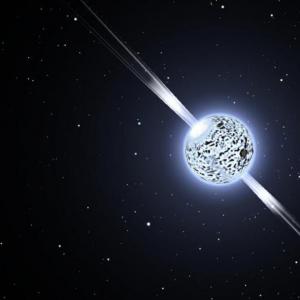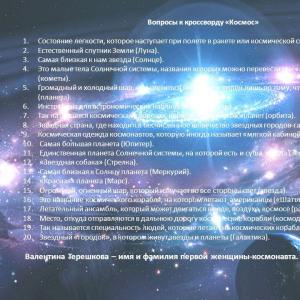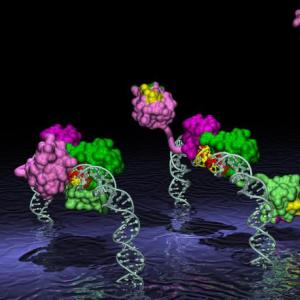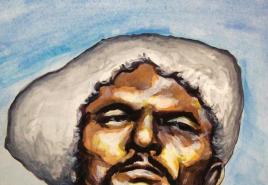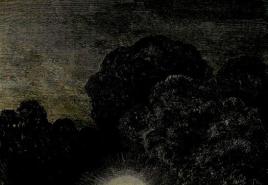What does the expression leave a mark on the earth mean? Class hour for primary school "what does it mean to leave your mark on the earth"
Every person leaves behind some kind of trace on Earth. Whether he is good or bad is everyone's choice. But the more good a person does, the better our world becomes, although it seems that this is imperceptible. But every action has its consequences, and the more good deeds there are, the more beautiful and better our world will become.
What a good mark you can leave on Earth
We can come up with many good deeds and ideas on how to make the world a better place, how to leave a mark, and how to make future generations proud of us and our world. Here's what you can do to help yourself and those around you, because you need to give only good, bad, and so much more:
- You can help orphanages. Children in such places are in great need of any support: material and moral.
- You can help people with incurable diseases or those who need expensive surgery. Even a small amount of money can save someone.
- You can help shelters with animals. Nowadays there are a lot of animals that do not have enough food. Bring food or toys for the animal to the shelter, this can greatly help them.
- You also need to choose a profession you like. This will help you live in harmony, because work is an important part of every person’s life. Need to go up career ladder, achieve success or even conduct experiments. After all, everyone has a chance to become famous and respected person, such as Albert Einstein, Alexander Pushkin or Wolfgang Amadeus Mozart. In this way, you can make a huge contribution to the development of our world.
- In addition, you need to leave a good mark on yourself among your family. It is very important to make future generations proud of you. We must strive to be a good wife, mother, grandmother or husband, father, grandfather. To do this, you need to help your family, raise children, take care of your significant other and create comfort and warmth in your home.
Is it difficult to leave a good mark on yourself on Earth?
I think it takes a lot of effort, but you have to try. I want to leave only a positive and kind mark and for this I will help people, study according to my calling and give joy to others.
Leave a trace(s) LEAVE A TRACE(S). LEAVE A TRACE(S). Express Having done something significant, having achieved significant results in something, to retain recognition among someone. Apparently, the head of the museum was an extraordinary person, who managed to leave a mark on herself and infect her with love for her work.(L. Anisov. Originally from Yelabuga). Chekhov's heroes, despite their short existence in Russian and world spiritual history, left their indelible traces. And today the images created by Chekhov are the series that is immortal for us(S. Zalygin. Genius of tact).
Phrasebook Russian literary language. - M.: Astrel, AST. A. I. Fedorov. 2008.
See what “Leave a trace (traces)” is in other dictionaries:
LEAVE A TRACE(S). LEAVE A TRACE(S). Express Having done something significant, having achieved significant results in something, retain recognition among someone. Apparently, the head of the museum was an extraordinary person, who was able to... ... Phraseological Dictionary of the Russian Literary Language
track- noun, m., used. very often Morphology: (no) what? trace and trace, trace, what? I follow, (see) what? trace of what? next, about what? about the trail and in the trail; pl. What? traces, (no) of what? traces of what? following, (see) what? traces of what? traces, about what? about traces 1... Dictionary Dmitrieva
track- 1) trace and trace (y), dates. follow, prev. about the trail, on the trail, plural. traces, m. 1. Imprint, impression of a foot or paw on which page. surfaces. He liked the snow, the pale street lamps, the sharp black footprints left by the soles of the first snow... ... Small academic dictionary
TRACK- In every (every) trace. 1. Eagle. Everywhere, everywhere. SOG 1992, 5. 2. Ryaz. Always, at all times. DS, 522. In a single trace. Kar. To the end, completely (remove, eliminate, destroy, etc.). SRGK 2, 21. Great trace. Mord. What's l. about? very necessary... Big dictionary Russian sayings
TRACK Ushakov's Explanatory Dictionary
TRACK- 1. NEXT1, trace (obsolete trace) and trace, date. follow, creative next, before next, plural traces, husband 1. An imprint, an imprint of something (a human or animal leg, wheels or runners of a carriage, etc.) on the ground or some other surface. "Saw… … Ushakov's Explanatory Dictionary
LEAVE- LEAVE, I love you; possessed; Sovereign 1. whom (what). When leaving or leaving, do not take it with you (intentionally or forgetting). O. book at home. O. children in the village. O. suitcase in the carriage. 2. what. Save, save. O. I'm eating (food) for dinner. O. reserve the right to do... ... Ozhegov's Explanatory Dictionary
Motives of Lermontov's poetry- MOTIVES of Lermontov's poetry. Motive is a stable semantic element lit. text, repeated within a number of folklore (where the motif means the minimum unit of plot structure) and lit. artist prod. Motive m.b. considered in the context of all creativity... ... Lermontov Encyclopedia
Forbidden topics in history- Forbidden Topics in History is a Russian series of films dedicated to the search for evidence of the existence of an ancient highly developed civilization on Earth. The legendary Atlantean civilization and other non-academic versions are considered as options. The authors do not... ... Wikipedia
Volt (cartoon)- This term has other meanings, see Volt (meanings). This article is about the cartoon. For the browser, see Bolt Browser. Volt Bolt ... Wikipedia
A person is not born to disappear without a trace as an unknown speck of dust. A person is born in order to leave an eternal mark on himself.
Man leaves himself first of all in man. This is our immortality. We live to imprint ourselves in our son or daughter, to live in their passions and work. This is the highest happiness and meaning of life. If you want to remain in the human heart, raise your children. Human education is the most important social duty.

His moral character depends on how clearly a person sees the highest meaning of his existence in fatherhood and motherhood. Our important educational mission is to ensure that the person we create is responsible not only for his current behavior, but also for the future, and the future is the mind, feelings, beliefs of a living person, whose roots are laid in the present. On the day the girls come of age, when they turn sixteen, I tell them the Ukrainian legend “Who is the most skillful craftsman on earth.”
I strive to ensure that throughout all the years of schooling a person comprehends a very subtle and complex science - the ability to see oneself. So that everyone, already in adolescence, thinks: what can I leave in people, in work, in life and bloom? What even the smallest drop from me will enter the eternal ocean human existence?
What is needed for this? How to conduct educational work in this direction?

To see yourself little man must learn to see life. To see a person, to understand and feel the beauty in him, to admire and be amazed by it, to relate himself to what he saw and understand, as if to try on his merits with what he considers a model. I think it is very important to tell teenagers, boys and girls about their lives. About what a person has done in his life, how he reports to the generations who take the baton of creativity and creation from him, as in the story about a bright human life - “The Most happy man on earth."
You are entering life, boys and girls. Before you is the sun of your captivating day - it has just risen above the horizon, its path is still ahead. You must plow the land and build houses, build bridges and graze cattle, rejoice at the arrival of birds from a warm region and worry about the fate of a tender blade of grass - a green sprout of wheat, go on long campaigns and shoot at the enemy if he decides to violate the sacred borders of our Motherland. In all this you will leave some grain of your soul, mind, talent. But you can only fully invest your soul in a person. Don't forget that you are to be fathers and mothers. In fatherhood and motherhood there is the most complex labor wisdom. This is work, work and a thousand times more work. You will have to listen with bated breath to the cry of your newborn son, father (I am now addressing you as future fathers). You will have to give birth to sons and daughters in pain and agony, mother (I am addressing you as future mothers). Going to the distant life path, remember that you need to take with you as much as possible more wealth from adolescence and youth - you need these riches for the creation of Man.
Eat folk tale about the Hollow Man. This man loved to sing and have fun, he could not stay in one place for a long time - he was constantly moving from a green field to a flowering meadow, from a flowering meadow to a shady grove. And then his son was born. The Barren Flower Man hung the cradle on an oak branch and sat singing. And my son is growing by leaps and bounds. He jumped out of the cradle, went up to his father and said:
- Father, show me what you did with your own hands?
The father was surprised at such wise speeches of his son and smiled. I thought about what to show my son? The son is waiting, but the father is silent and has stopped singing. The son looks at the tall oak tree and asks:
- Maybe it was you who planted the oak tree?
The father bowed his head and remained silent.
The son took his father into the field, looked at the full ear of wheat, and asked:
- Maybe it was you who grew the ear?
The father bowed his head even lower and remained silent.
The son and father came to the deep water, the son looked at the blue sky reflected in the water and said:
- Father, say a word of wisdom...
And the Man-Empty Flower not only cannot do anything with his hands, but also cannot speak the words of the wise. He bowed his head even lower and was silent... And so he turned into barren grass. It blooms from spring to autumn, but produces neither fruit nor seed.

Fear, boys and girls, that it is the greatest sorrow that you will enter life as an empty flower. You will be ashamed in front of your son, in front of your daughter, in front of people for the life you lived without a trace.
It’s scary to think that this could happen: an old man walks the earth, as if he deserves respect, but it turns out that no one knows who this man is, and he deserves neither respect nor memory.
I often tell teenagers and young men about a respected, worthy person who has passed away, trying to awaken an ardent desire to leave behind a bright mark on the earth. These stories are the grains that make up living history our modernity. Bringing to the consciousness, to the soul of a teenager, the meaning of a rich, rich life given to people is not a memorial, but a hymn to life.
Vasily Aleksandrovich Sukhomlinsky is an outstanding Soviet teacher-innovator. How to raise a real person: (Ethics of communist education)
If you liked this material, then we offer you a selection of the most the best materials our site according to our readers. You can find the TOP selection about the theory of the emergence of civilizations, the history of mankind and the universe where it is most convenient for youText No. 14
Task No. 1. Read the text by K. Chukovsky, answer the questions and fill out the table:
A life-affirming, dynamic, inexhaustibly active nature, Chekhov sought not only to describe life, but also to remake, to build it, without having his head in the clouds.
Then he is busy building the first People's House in Moscow with a reading room, a library, an auditorium, and a theater.
He is trying to ensure that a clinic for skin diseases is built right there in Moscow.
Then he is busy setting up the first biological station in Crimea.
Then he collects books for Sakhalin schools and sends them there in batches.
He is building schools for peasant children not far from Moscow, and at the same time a bell tower and a fire shed for peasants. And later, having settled in Crimea, he built a fourth school there.
In general, any construction fascinates Chekhov, since, in his opinion, it always increases the amount of human happiness.
“I remember his childhood joy,” says Stanislavsky, “when I once told him about a large house being built at the Red Gate in Moscow to replace the inferior one-story mansion that was demolished. Anton Pavlovich talked about this for a long time afterwards with delight to everyone who came to visit him.”
One day Gorky read to him his proud song about a man-builder, eager to transform the entire planet through tireless agriculture and construction, and in this song it was said:
I would go around the circle of the earth and plow it all up,
I would go around forever - I would fence cities,
I would build churches and plant gardens!
I would decorate the earth like a girl...
Chekhov could not help but like this song, since it fully expressed his own belief in the salvation of our thousand-year-old gardening and architecture.
“If every person on his piece of land did everything he could, how beautiful our land would be!” - he then said to Gorky. And he wrote in his book: “A Muslim digs a well to save his soul. It would be good if each of us left behind a school, a well or something like that, so that life does not pass and go into eternity without a trace.”
(K. Chukovsky)
1.What is the theme of K. Chukovsky’s text?
2.What main problems of the text can you identify?
3. How can you characterize the problem of the text (select as necessary):
· acute;
· important;
· serious;
· controversial;
· urgent;
· main;
· deep;
· mature;
Unsolvable...
Task No. 2. Restore the entry in the table (“Subject”); independently formulate the problems of the text and identify the author’s position, based on the material in the table:
Task No. 3. Read the text of the student’s essay and answer the questions:
Every person tries to leave a good memory of himself on earth: he plants trees, writes books, builds churches... But he does all this not for his own sake, not out of vanity - for the benefit of those around him. This is exactly what is described in the text by K. Chukovsky.
The question of what is necessary to leave behind a “useful memory”, to create what people need, is important and significant for each of us. But in order not to live your life in vain, you need to choose the right goal in life, and not be deceived in this choice. We need to start this “construction” have a wonderful life around itself so that it increases “the sum of human happiness of all people on earth.” From this position, the problem raised by K. Chukovsky can be called philosophical and moral.
The author strives to convey to the reader the idea: “it would be good if each of us left behind” something useful. At the same time, K. Chukovsky draws our attention : “if every person on a piece of land did everything he could,” then “our land would be beautiful.” In addition, he concludes: life will not pass and will not go “to eternity without a trace” if each of us takes care of what he leaves to the next generation.
I can’t help but agree with the author who calls for leaving behind something that everyone needs: someone will build a school, someone will dig a well, and someone will tidy up an abandoned playground. The main thing is that children's eyes will look into your face with gratitude and completely strangers will be happy.
Many Russian poets and writers have addressed the issue that a cause must be beneficial in order to remain in people’s memory. So, in the novel by L.N. Tolstoy's "War and Peace" one of the main characters Pierre Bezukhov not only thinks about the need to do useful things, but also puts his plan into action. He opens schools and hospitals for peasant children deprived of the opportunity to learn to read and write, and builds hospitals for the poor. Pierre Bezukhov does this at the behest of his heart, which tells him that this is how he will fulfill his civic duty.
In addition, in the history of our Fatherland there are many examples of “beautiful, creative” construction. Thus, many of the famous doctors of the 9th - early 20th centuries laid the foundation for a tradition: they initiated the construction of hospitals for the poor, those who found themselves “at the bottom” of life. The names of S.P. will remain in our memory. Botkina, N.I. Pirogova, N.F. Filatova. It would be nice if this tradition were revived today!..
So, after reading the text by K. Chukovsky, I came to the conclusion that each of us needs to try to leave our mark in the life of our family, our city, and, perhaps, the state as a whole. But this will happen only if we strive for everyone’s happiness, and not for our own personal happiness. Only then will our life not disappear into eternity without a trace.
2. Has the topic of the text been transformed into a problematic issue? /(highlight the design with colored paste, put the symbol in the margin PT**)
3. What, according to the student’s work, is the main (main) idea of K. Chukovsky’s text?
4. What constructions in his work does the student use to formulate a commentary on the problem stated by the author of this text, K. Chukovsky? (Highlight these structures with colored paste, put the symbol in the margins KP***)
5. What constructions in his essay does the student use to formalize the position of the author (K. Chukovsky), discussing the importance of the problem of leaving one’s mark on the earth? (Highlight these structures with colored paste, put the symbol in the margins PA****);
6. What constructions in his essay does the student formulate his opinion on the problem of the text? Is part of the text a reasoning, or is it a statement: a statement of agreement with the position of the author of the text, K. Chukovsky? (Highlight these structures with colored paste, put the symbol in the margins CM*****);
7. Have students provided evidence of their own opinion on the problem identified by the author of the text? Does the evidence provide illustrations of the argument being made? (Highlight the actual argument and illustration of the argument in the proof with colored paste, put the symbols ****** in the margins D1, A1, Il1; D2, A2, Il2).
8. Has the student made a conclusion that completes the reasoning based on the text by K. Chukovsky? (Highlight the construction that forms the conclusion in the student’s essay with colored paste, and put the symbol in the margin IN*******)
Task No. 4. Do a self-test using the hint given in this activity:
Class hour for 3rd grade.
Topic: “What does it mean to leave your mark on earth?”
Goal: To identify with students an understanding of the problem of the meaning of life, their mark on earth
Tasks:
1) Determine goals for your future life;
2) Rdevelopability to analyze,compare,doconclusions; distinguish between good and evil;
3) Promote a correct attitude towards the actions of other people and your own;carefulattitudeTonature.
Equipment: Computer, projector, pictures with traces, envelope with forfeits, presentation about famous people, a picture of the globe, carved footprints on desks, pens. (numbers 1,2,3,4 should be attached under the desks before the start of the lesson to play “Fanta”)
Class hour plan:
Showing pictures with traces, determining the topic of the class hour
Game "forfeits"
Conversation and presentation about people who left their mark on the earth.
Game "Yes-no"
Write your dreams or 1 thing that you would like to do for the benefit of other people.
Conclusion.
Progress of the event
Hello guys. My name is Olga Viktorovna. We are not alone today, we have many guests, let's stand up and greet them.I'm glad we're all here.
Even if we hardly know each other,
But I hope we understand each other
And pictures will help us with this,
Where will we start the class hour? .
(there is a picture of the globe on the board)
demonstration of pictures with footprints (hang them on a board around the globe)
(children guess who the footprints belong to
1.cat tracks
2. bird tracks
3. human footprints in the sand
4. garbage.
Guys, what do you think we will talk about today (presumable answers from children)
Today we will talk on the topic: “What does it mean to leave your mark on the earth?”
But before we start talking about it. I want to invite you to play with me. There are numbers under the covers of your desks.
(call 4 people to the board).
Game "forfeits"
Guys, I didn’t choose this game by chance. Do you know where it came from?
(previously, candy was not wrapped in wrappers, they were placed in special boxes. Thomas Edison invented candy wrappers - this is paper soaked in paraffin, it helped the candies to be stored longer. We still use his invention today)
Slide "Candy wrappers"
guys, what do you know about Thomas Edison? (children's answers)
Information about Edison
SLIDE portrait of Edison
Slide with light bulb
Guys, look at these slides now. What do you see on them?
(Children's answers)
And on this slideGerman politician and speaker, founder of the totalitarian dictatorship of the Third Reich, German Fuhrer Adolf Hitler.
SLIDE 3 war-damaged houses
SLIDE 4 bombs
SLIDE 5 crying people
SLIDE 6 Hitler
To summarize our conversation, I would like to hear from you which person you remember today on the positive side, and which one on the negative side?
Slide + and -
It turns out that these people left traces of their life on earth.
We can take other examples and consider whether a person left good traces or evil ones.
Some examples carry a creative force (love, goodness), others - a destructive force. It all depends on what goals a person sets for himself, what he dreams of.
To learn to distinguish between good and evil, we will play a little
Yes-no game
I hope that our conversation with you today has sunk into your hearts and you will be very careful about what mark you want to leave on earth.
I invite you to think about what you would like to become in order to bring much benefit to all people.
(you can write what good deed you would like to do for the benefit of other people)
Slide with globe
There are carved footprints on the tables (ask the children to write their dream or one thing that, in your opinion, would be the beginning of your good deeds on earth)
After the children have written, each person voices their idea and attaches it to the globe with a magnet.
Yes-no game
An underrated genius
Edison was considered mentally retarded as a child
Thomas Edison was born on February 11, 1847 in the small town of Mylen, located in Ohio in the USA.
During his childhood, Thomas was inferior in height to many of his peers, looking a little sickly and frail. He suffered a severe illness from scarlet fever and practically lost his hearing. This affected his studies at school - the future inventor studied there for only three months, after which he was sent to home schooling with the teacher’s insulting verdict of “limited.” As a result, her son was educated by her mother, who managed to instill in him an interest in life.
Thomas's first experience as an inventor did not bring him fame. His first apparatus for counting votes during elections turned out to be of no use to anyone; American parliamentarians considered it completely useless. After the first failures, Edison began to adhere to his golden rule - not to invent something that is not in demand.
Mimeograph - a device for printing and duplicating written sources in small editions, which Russian revolutionaries loved to use.
A method of storing organic food in a glass container was patented in 1881 and involved the creation of a vacuum environment in the container.
Kinetoscope - a device for watching a movie by one person. It was a massive box with an eyepiece through which you could see a recording lasting up to 30 seconds. It was in good demand before the advent of film projectors, to which it seriously lost in terms of mass viewing.
Telephone membrane - a device for reproducing sound, which laid the foundations of modern telephony.
Stencil pen - a pneumatic device for perforating printed paper, patented in 1876. For its time, it was the most effective device capable of copying documents. 15 years later, S. O'Reilly created a tattoo machine based on this pen.
Fluoroscope - an apparatus for fluoroscopy, which was developed by Edison's assistant K. Delli. In those days x-rays were not considered particularly dangerous, so he tested the device on his own hands. As a result, both limbs were subsequently amputated, and he himself died of cancer.
Electric car - Edison was truly obsessed with electricity and believed that it was the real future. In 1899, he developed an alkaline battery and intended to improve it to increase its service life. Despite the fact that at the beginning of the 20th century in the United States more than a quarter of cars were electric, Thomas soon abandoned this idea due to the widespread use of gasoline engines.
Light bulb

